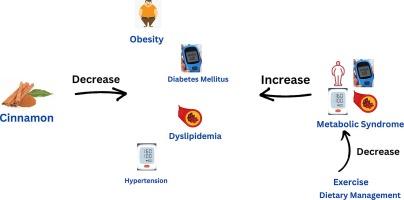食用肉桂(Cinnamomum verum)对代谢综合征的治疗前景
IF 3.8
2区 农林科学
Q2 FOOD SCIENCE & TECHNOLOGY
引用次数: 0
摘要
代谢综合征(MetS)是全球最重要的公共卫生问题之一。高血压、内脏肥胖、高血糖、血脂异常和胰岛素抵抗是其中的一些诱因。最新的 MetS 预防措施侧重于生活方式因素和综合疗法,包括运动和草药治疗。肉桂(Cinnamomum verum)富含植物化学物质,包括酚类和挥发性化合物,具有抗肿瘤、抗癌、抗糖尿病和抗高甘油三酯血症的潜力。大量临床研究表明,肉桂具有治疗糖尿病的抗炎特性。肉桂对维持血液中血脂的正常水平至关重要。在过去十年中,多项临床研究探讨了服用肉桂对治疗炎症相关疾病、代谢异常和多囊卵巢综合症的效果。本综述全面介绍了肉桂和肉桂醛的化学成分、营养成分、植物成分以及对代谢综合征的保护作用。本综述还努力解释了血糖管理、内脏肥胖管理以及肉桂安全性和毒性方面的机制。本文章由计算机程序翻译,如有差异,请以英文原文为准。

The therapeutic perspective of cinnamon (Cinnamomum verum) consumption against metabolic syndrome
Metabolic syndrome (MetS) is one of the most significant worldwide public health issues. Hypertension, visceral obesity, hyperglycemia, dyslipidemia, and insulin resistance are some of the contributing variables. The latest MetS preventative measures have focused on lifestyle factors and combination therapy, including exercise and herbal treatment. Cinnamon (Cinnamomum verum) is rich in phytochemicals, including phenolic and volatile compounds, responsible for its antitumor, anticancer, antidiabetic, and anti-hypertriglyceridemia potentials. Numerous clinical studies have demonstrated the value of cinnamon’s anti-inflammatory properties in treating diabetes. Cinnamon is crucial in maintaining normal levels of lipids in the blood. In the past ten years, several clinical studies have examined the effectiveness of cinnamon administration in managing inflammation-related diseases, metabolic abnormalities, and polycystic ovarian syndrome. Comprehensive information about the chemical composition, nutritional compounds, phytoconstituents, and protective role of cinnamon and cinnamaldehyde against metabolic syndrome has been presented in this review. An effort has also been made to explain the mechanisms of blood glucose management, visceral obesity management, and cinnamon safety and toxicity aspects.
求助全文
通过发布文献求助,成功后即可免费获取论文全文。
去求助
来源期刊

Journal of Functional Foods
FOOD SCIENCE & TECHNOLOGY-
CiteScore
9.60
自引率
1.80%
发文量
428
审稿时长
76 days
期刊介绍:
Journal of Functional Foods continues with the same aims and scope, editorial team, submission system and rigorous peer review. We give authors the possibility to publish their top-quality papers in a well-established leading journal in the food and nutrition fields. The Journal will keep its rigorous criteria to screen high impact research addressing relevant scientific topics and performed by sound methodologies.
The Journal of Functional Foods aims to bring together the results of fundamental and applied research into healthy foods and biologically active food ingredients.
The Journal is centered in the specific area at the boundaries among food technology, nutrition and health welcoming papers having a good interdisciplinary approach. The Journal will cover the fields of plant bioactives; dietary fibre, probiotics; functional lipids; bioactive peptides; vitamins, minerals and botanicals and other dietary supplements. Nutritional and technological aspects related to the development of functional foods and beverages are of core interest to the journal. Experimental works dealing with food digestion, bioavailability of food bioactives and on the mechanisms by which foods and their components are able to modulate physiological parameters connected with disease prevention are of particular interest as well as those dealing with personalized nutrition and nutritional needs in pathological subjects.
 求助内容:
求助内容: 应助结果提醒方式:
应助结果提醒方式:


